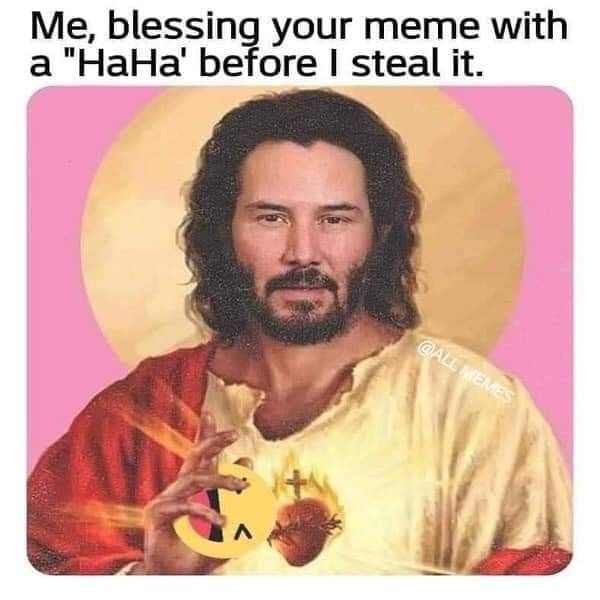Ethics of copying
Contents
11.5. Ethics of copying#
11.5.1. Remixing#
Much of the internet has developed a culture of copying and modifying other content, and not necessarily giving attribution to where it came from.
For example, let’s look at this meme about stealing memes:

Fig. 11.11 A meme about stealing memes. (It is unclear how we should cite this)#
The meme above is composed of many pieces copied from elsewhere, and modified and put together. Here are the pieces we could identify:
A painting: SACRED HEART OF JESUS by Dona Gelsinger (which itself is copying the form of many paintings before of the sacred heart)
The background was switched out to make a yellow disk halo behind the head of Jesus
Jesus face is replaces with Keanu Reeves’ bearded face (perhaps from the spongebob movie)
A laughing emoticon is placed in Jesus’ hand.
A watermark from @AllMemes appears on Jesus’ shoulder.
The text about stealing memes added at the top
Communities based on this type of remixing have existed outside the Internet before showing up in social media platforms, such as sampling in hip hop music in the 1980s.
In an anthropological introduction to YouTube (from 2008), Michael Wesch observes this phenomenon:
And this is something really quite profound that’s happening. Where we can remix this culture that’s being thrown at us, where we can take it, re-appropriate it and throw it back. […] Most of what we do is actually illegal, any remixing is basically illegal. And I could talk more about the- the parameters of that, we have fair use laws that should protect it but the simple fact of ripping a DVD is actually illegal which makes virtually everything we do illegal.
11.5.2. Cultural appropriation#
The online community activity of copying and remixing can be a means of cultural appropriation, which is when one cultural group adopts something from another culture in an unfair or disrespectful way (as opposed to a fair, respectful cultural exchange). For example, many phrases from Black American culture have been appropriated by white Americans and had their meanings changed or altered (like “woke”, “cancel”, “shade”, “sip/spill the tea”, etc.).
Additionally, White Americans’ use of images and gifs of Black people reacting and expressing emotions has been compared to earlier (and racist) art forms of blackface, where White actors would paint their faces black and then act in exaggerated unintelligent ways.
11.5.3. Citation and giving credit#
So given the community activities on social media of copying, remixing, cultural appropriate, and cultural exchange:
How do you think attribution should work when copying and reusing content on social media?
When is it ok to not cite sources for content?
When should sources be cited, and how should they be cited?
How can you participate in cultural exchange without harmful cultural appropriation?
